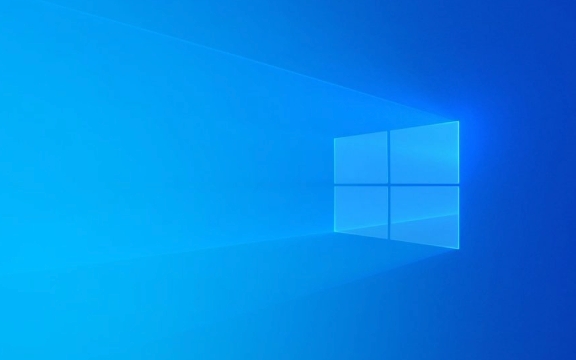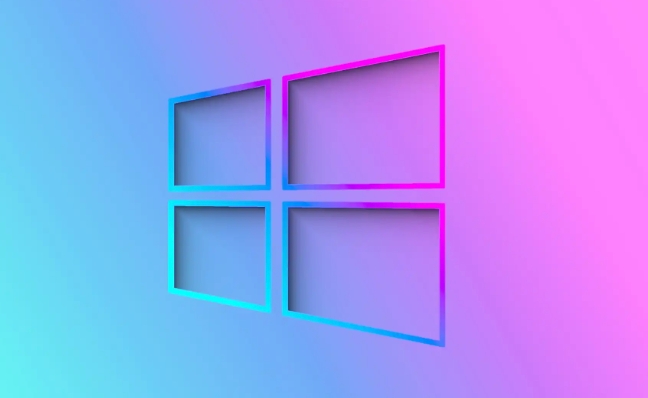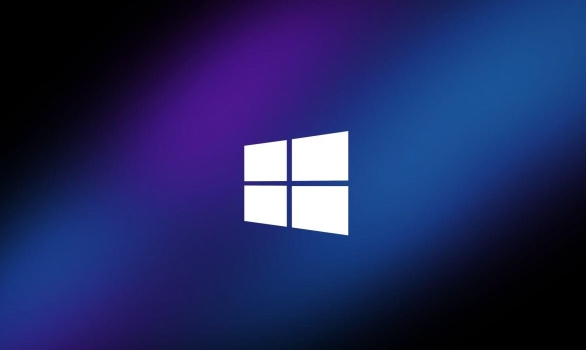Use the disk management tool that comes with Windows 10 to complete hard disk partitioning operations. 1. Press Win R to enter diskmgmt.msc or enter the disk management interface through the Start menu; 2. Initialize the disk (when used for the first time); 3. Ensure that there is unallocated space (can be obtained through compressed volume); 4. Right-click the unallocated area and select Create a new simple volume, set the size, drive letter and NTFS format; 5. After the new partition is completed, you can view it in the Explorer. Notes include: keeping some empty space for adjustment, formatting will clear the data and need to be confirmed in advance, the extended volume can be used to merge the unallocated space after the partition, and deleting the volume will cause data loss and must be backed up. Practical suggestions are: avoid excessive partitions affecting management and capacity expansion, reserve more than 50GB of space in the system disk, and keep the system disk in NTFS format. The entire process can be operated in steps, and the key steps need to be handled with caution.

If you are using a Windows 10 system and want to partition the hard disk but don’t know where to start, the operation is not complicated, just find the correct tools and steps. The disk management function that comes with Windows is sufficient to complete basic partitioning tasks and does not require additional software installation.

Open Disk Management Tools
The first step is to enter the "Disk Management" interface. You can press Win R key to open the run window, enter diskmgmt.msc and press Enter; or right-click "Start Menu" and select "Disk Management".
After entering, you will see the current status of all disks, including partitioned volumes, unallocated space and other information. If this is your first partition, you may need to initialize the disk first (the system will prompt you whether to do this).

Basic process for creating a new partition
In disk management, there are mainly the following steps to create a new partition:
- Make sure there is "unallocated" space on the disk. If not, you can right-click the existing partition and select "Compress Volume" to make space.
- Right-click on the "Unallocated" area and select "New Simple Volume".
- Follow the wizard to set the partition size, allocate the disk letter, and format the file system (usually NTFS).
- Once the setup is complete, the new partition appears in Explorer.
It should be noted that when partitioning, do not use up all space, leave a little space for easy adjustment. In addition, formatting will clear the partition data, so be sure to confirm that there are no important files in it before operation.

Adjust or delete an existing partition
Sometimes you want to merge two partitions or re-divider the capacity, and you can use the "Extend Volume" or "Delete Volume" function.
- If there is "unallocated" space behind a partition, you can right-click the partition and select "Extended Volume" to merge this part of the space.
- Deleting a partition is also very direct: right-click the target partition, click "Delete Volume", and then the original space becomes an unallocated state.
However, be aware that deleting the volume will cause all contents of the partition to be lost, so be sure to back up in advance.
Some practical suggestions for partitioning
- Don’t divide too many zones at once : too many partitions are not only troublesome to manage, but may also lead to difficulties in later expansion.
- Don’t be too small for the C drive : try to reserve more than 50GB of the system drive, especially for SSD users, to avoid the system running slower.
- Keep the system disk in NTFS format : Do not change the file system type unless you have special needs.
Basically these are the operations. The whole process is not difficult, but be careful at every step, especially deletion and formatting operations. As long as you do it step by step, there will generally be no problems.
The above is the detailed content of How to partition a hard drive in Windows 10. For more information, please follow other related articles on the PHP Chinese website!

Hot AI Tools

Undress AI Tool
Undress images for free

Undresser.AI Undress
AI-powered app for creating realistic nude photos

AI Clothes Remover
Online AI tool for removing clothes from photos.

Clothoff.io
AI clothes remover

Video Face Swap
Swap faces in any video effortlessly with our completely free AI face swap tool!

Hot Article

Hot Tools

Notepad++7.3.1
Easy-to-use and free code editor

SublimeText3 Chinese version
Chinese version, very easy to use

Zend Studio 13.0.1
Powerful PHP integrated development environment

Dreamweaver CS6
Visual web development tools

SublimeText3 Mac version
God-level code editing software (SublimeText3)

Hot Topics
 Windows 11 slow boot time fix
Jul 04, 2025 am 02:04 AM
Windows 11 slow boot time fix
Jul 04, 2025 am 02:04 AM
The problem of slow booting can be solved by the following methods: 1. Check and disable unnecessary booting programs; 2. Turn off the quick boot function; 3. Update the driver and check disk health; 4. Adjust the number of processor cores (only for advanced users). For Windows 11 systems, first, the default self-start software such as QQ and WeChat are disabled through the task manager to improve the startup speed; if you use dual systems or old hardware, you can enter the power option to turn off the quick boot function; second, use the device manager to update the driver and run the chkdsk command to fix disk errors, and it is recommended to replace the mechanical hard disk with SSD; for multi-core CPU users, the kernel parameters can be adjusted through bcdedit and msconfig to optimize the startup efficiency. Most cases can be corrected by basic investigation
 How to Change Font Color on Desktop Icons (Windows 11)
Jul 07, 2025 pm 12:07 PM
How to Change Font Color on Desktop Icons (Windows 11)
Jul 07, 2025 pm 12:07 PM
If you're having trouble reading your desktop icons' text or simply want to personalize your desktop look, you may be looking for a way to change the font color on desktop icons in Windows 11. Unfortunately, Windows 11 doesn't offer an easy built-in
 Fixed Windows 11 Google Chrome not opening
Jul 08, 2025 pm 02:36 PM
Fixed Windows 11 Google Chrome not opening
Jul 08, 2025 pm 02:36 PM
Fixed Windows 11 Google Chrome not opening Google Chrome is the most popular browser right now, but even it sometimes requires help to open on Windows. Then follow the on-screen instructions to complete the process. After completing the above steps, launch Google Chrome again to see if it works properly now. 5. Delete Chrome User Profile If you are still having problems, it may be time to delete Chrome User Profile. This will delete all your personal information, so be sure to back up all relevant data. Typically, you delete the Chrome user profile through the browser itself. But given that you can't open it, here's another way: Turn on Windo
 How to fix second monitor not detected in Windows?
Jul 12, 2025 am 02:27 AM
How to fix second monitor not detected in Windows?
Jul 12, 2025 am 02:27 AM
When Windows cannot detect a second monitor, first check whether the physical connection is normal, including power supply, cable plug-in and interface compatibility, and try to replace the cable or adapter; secondly, update or reinstall the graphics card driver through the Device Manager, and roll back the driver version if necessary; then manually click "Detection" in the display settings to identify the monitor to confirm whether it is correctly identified by the system; finally check whether the monitor input source is switched to the corresponding interface, and confirm whether the graphics card output port connected to the cable is correct. Following the above steps to check in turn, most dual-screen recognition problems can usually be solved.
 Want to Build an Everyday Work Desktop? Get a Mini PC Instead
Jul 08, 2025 am 06:03 AM
Want to Build an Everyday Work Desktop? Get a Mini PC Instead
Jul 08, 2025 am 06:03 AM
Mini PCs have undergone
 Fixed the failure to upload files in Windows Google Chrome
Jul 08, 2025 pm 02:33 PM
Fixed the failure to upload files in Windows Google Chrome
Jul 08, 2025 pm 02:33 PM
Have problems uploading files in Google Chrome? This may be annoying, right? Whether you are attaching documents to emails, sharing images on social media, or submitting important files for work or school, a smooth file upload process is crucial. So, it can be frustrating if your file uploads continue to fail in Chrome on Windows PC. If you're not ready to give up your favorite browser, here are some tips for fixes that can't upload files on Windows Google Chrome 1. Start with Universal Repair Before we learn about any advanced troubleshooting tips, it's best to try some of the basic solutions mentioned below. Troubleshooting Internet connection issues: Internet connection
 How to clear the print queue in Windows?
Jul 11, 2025 am 02:19 AM
How to clear the print queue in Windows?
Jul 11, 2025 am 02:19 AM
When encountering the problem of printing task stuck, clearing the print queue and restarting the PrintSpooler service is an effective solution. First, open the "Device and Printer" interface to find the corresponding printer, right-click the task and select "Cancel" to clear a single task, or click "Cancel all documents" to clear the queue at one time; if the queue is inaccessible, press Win R to enter services.msc to open the service list, find "PrintSpooler" and stop it before starting the service. If necessary, you can manually delete the residual files under the C:\Windows\System32\spool\PRINTERS path to completely solve the problem.







